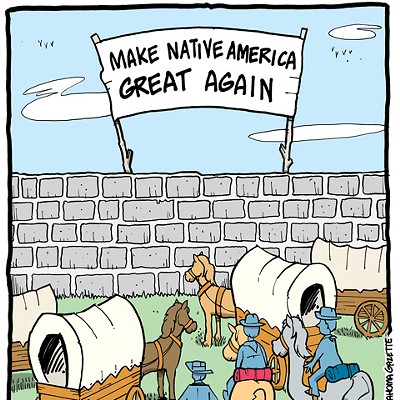Last month's primary elections were heavy with the usual rhetoric: smooth talk, trash talk, sweet talk, empty talk.
Now God talk has been added to what was one of the most alienating elections we've had in a long time.
In the 5th U.S. House District Republican primary, the five candidates became whirling dervishes of religious frenzy. In an apparent effort to prove that he or she was more Christian than his or her opponents, the candidates used an excessive amount of religious symbolism in paid advertising, often invoked God's name in media appearances and felt compelled even to tell us what church they attend as proof of their devotion.
Some candidates suggested that frequency of church attendance counts toward being "a better" Christian.
Mick Cornett, still Oklahoma City's mayor but the loser of the GOP runoff, even told us that his wife worked at their church, as if this fact should be added to his list of qualifications for representing us in Washington. His opponent and now the strongest contender for the U.S. House seat, Mary Fallin, was the most modest in her proclamations, although she used the word "faith" in every ad.
Beyond that race, one candidate for state legislative office, whose name I have gladly forgotten, ended his ads with this tagline: "I'm a Christian. I belong here." Another passed out prayer cards, asking Jesus to help him get elected.
I am not a Christian. But I belong here, too.
The public pledge of faith is an important part of our religious landscape and it plays an important role in defining who we are. But this new tactic " a competition to see whose Christian credentials are the best " goes too far.
Isn't religion meant to be observed on a higher plane than in paid political advertising? Why are we letting the grace and spiritual life we strive for through faith become a childlike climbing competition to see who can get to the top of the piety pole? Aren't Christians along with many of us non-Christians offended by this imposition of religious affiliation into politics?
The roots of this mix of religion and politics do not derive from our nation's founders, who were not compelled to wear their religious beliefs on their politician's lapels. In fact, the authors of our documents of independence were very careful to draw a line between church and state, having themselves been descendants of those who settled our country in flight from religious persecution that often was state-sponsored.
Instead, public expression of one's Christian faith finds its roots in the revival tents that dotted the Oklahoma landscape not that long ago, and in the more recent manipulation of religious labels to win or drive away support for certain national candidates. But should we let religion " anyone's " be used as a political tool?
Our founders agreed that religion and politics make bad bedfellows because the memories of religious wars were still fresh for them. Surely today's headlines from Iraq are enough to remind us of the death and destruction caused when religion becomes part of the political debate.
Maybe I'm a little old-fashioned about religion. I don't want it to become part of our government or our political debate. I don't want religion " yours, mine or theirs " in the public square, on the courthouse lawn or anywhere near my voting booth.
The irony is this: Those who wish to make their religious faith part of the political debate should recall that for two centuries the Roman Empire brought the full weight of the state down on the members of a pesky fringe religious group in an effort to stamp them out. They were called Christians. - Pam Fleischaker
Fleischaker, former Oklahoma Gazette associate editor, has served as a commentary writer since 1987.












